Archana Masih/Rediff.com talks to India’s most loved writer.
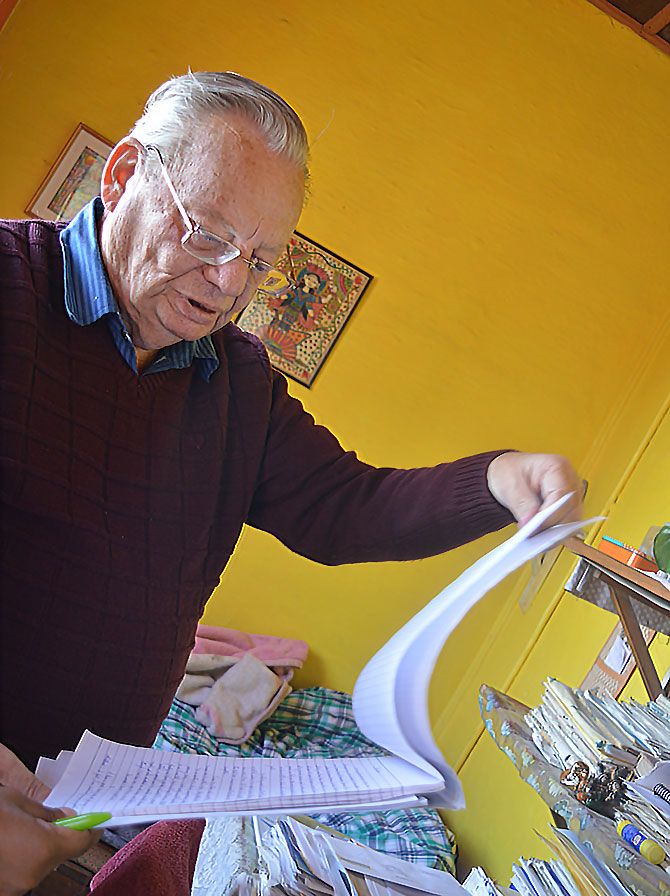
Ruskin Bond laughs a lot and talks as someone much younger than his 80 years. He is friendly, wears cute slip-on pumps with brown bears and asks if we’ve had breakfast on a Sunday morning at his home in Landour, Mussoorie.
He is also Landour’s most famous resident at whose door tourists often arrive unannounced, and at unearthly hours. Some even at 6.30 in the morning.
For a writer whose stories have been loved by three generation of readers, adulation comes aplenty, even at the cost of his privacy that he cherishes enormously.
His home on the first floor, up a red flight of stairs is cosy with yellow and orange walls. Heaps of books meet your eyes wherever you look, his Padma Shri hangs in a corner. (He was also honoured with a Padma Bhushan last year.)
“I used to see the valley clearly, now it is hazy. If I leave the windows open, monkeys come in,” he says looking out of the window with an orange geranium pot resting on its ledge.
His writing table is placed opposite the window. A small bed next to it.
“It’s conveniently situated, when I get drowsy I sleep,” he chuckles, standing beside that writing desk from where he has written scores of wonderful stories. It is covered with books and papers, with literally only a corner left vacant.
“I just have a little corner left to write,” he says, showing me the first page of his biography, written in beautiful handwriting with a blue pen. He has only reached till age 8 and has seven more decades to cover.
I feel a thrill looking at the first chapter called First Loves.
Mr Bond had given me an appointment after I sent him a handwritten letter. Chatting with him was discovering all over again the world he has introduced so many Indians to through his simple and brilliant storytelling.
What is the most interesting thing a fan has said to you?
There was this little girl in a school in Delhi. I was interacting with the class and the teacher asked, ‘What do you think of Mr Bond as a writer?’
She thought about it, looked me up and down and said, ‘Sir, you are not a bad writer.’
I take that as a compliment.
In Landour Days you wrote that once when you checked into a hotel, the receptionist asked, ‘When did you arrive in India’?
Yes, that was in Delhi. Now of course everyone has to produce ID – back at that time we didn’t have to – and they kept asking me when did you arrive in India?
So I finally said I arrived in India in 1934 -- by stork!
Does this still happen to you?
Lot of people now know. I was at Delhi airport recently and the chap who checks your security (at the entrance) saw my ID and said, ‘Ruskin Bond, you are a writer’.
He wasn’t a reader but he knew. Lot of people recognise me that’s true.
How do you handle fame?
I don’t handle it…(laughs)... I ignore it.
It’s nice people come up and say hello and chat but not at 6 in the morning!
A few weeks ago, it was 6.30 am we were all asleep, a car stopped, some tourists came to the door and said, ‘We are on our way to Dhanaulti and thought we’ll just see Ruskin Bond first’.
Beena (his adopted family member) said of course not and sent him away... (laughs) … so sometimes it is irritating.
If I am having a bath in my kaccha baniyan or writing and someone comes pounding at the door (laughs)... and they all say but we’ve come all the way from Bangalore or Bombay and I think it’s not my fault... (laughs)
So do you have many visitors coming by at your door?
Not so much now because it’s off season but yes, during summer.
Once you returned from England after spending three years there, you never left India again?
That’s true. I came back in 1955 and am still here. Except for short visits to Nepal or Dubai but not for long stays – no.
In fact it was a nightmare for me the thought that I might have to go back because I wasn’t particularly happy in England. I can’t say I was unhappy but I was so much happier here that the thought of going there again didn’t excite me.
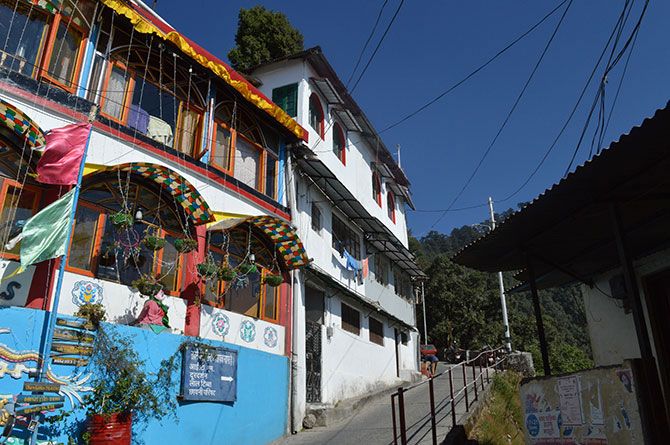
Did you choose Landour or did Landour choose you?
I chose Mussoorie for practical reasons. Having grown up in Dehradun, I knew the area.
I came to this house in 1980. First as a tenant, then after few years, I managed to buy this upper storey.
In a way I came to Landour looking for accommodation. It is different from Mussoorie. It is 1,000 feet higher than the Mall Road in town. It is quieter. It’s not built up being a cantonment area, although people get away with adding things here and there.
After living and working in Delhi for 4-5 years, I made my great escape to the hills but I still wanted to be in touch with publishers/ editors and Mussorrie was closer to Delhi than other hill resorts.
Many of your stories are set in trains, stations…what are your memorable train journeys?
There was a very long one to Bombay I remember. It was the Emergency, when someone in Bombay had brought a case against me for writing a story they said was obscene.
It’s called The Sensualist and had then been published in Debonair when Vinod Mehta was the editor.
So I had to keep going there to appear in court.
It was published later by Penguin. It’s a short novella but the case dragged on for two years. Then the judge finally said he had enjoyed the story and it wasn’t obscene… (laughs).
So much what is written now is far more if not obscene but more explicit.
Earlier train journeys were far more interesting. In those days there were separate compartments and it was easier to meet people and interact. You could open your windows, they were not glazed like today where you can’t see anything.
In this particular journey we got to Baroda at 2 in the morning and everyone had told me to shut the window at night.
I had left it open because it was very hot and I put my spectacles under my pillow. At Baroda I felt a hand coming through the window and exploring under the pillow. As the hand was withdrawn, this youngster had my spectacles.
He had it from one end, I got the other and we had a tug-of-war. I got the glasses back but the arms had been twisted and there was no time to get a new pair and next day I had to appear in court.
So every time, the judge asked me a question and I said ‘Yes your honour, no your honour’ they would fall off!
One of your first stories I read was Night Train at Deoli, how long did it take you to write it?
That was one of my earlier stories. I was 21 when I wrote it and had a romantic look, there was always a chance of a big romance in your life.
I hadn’t become an old cynic, I am not one now... (laughs).
It took me an hour or two to write it in 1956-57. I used to write 4-5 stories a month. I got Rs 50 for it.
Is there a railway station called Deoli?
There is a Deoli. In fact there are 3. One is in MP.
My Deoli was set here and it came to me randomly.
The Eyes have it is another one that is popular.
So much of what you’ve written is drawn from your childhood memories. Are there things you’ve kept in your treasure box of memories?
My father’s old school prayer book, on which is written ‘Aubrey Alexander Bond, Lovedale, 1913’.
He was a trainee teacher in Lovedale in the Nilgiris.
A couple of letters and postcards. A lot of childhood photographs. Photos in Jamnagar and Delhi during the War where I am wearing his RAF cap (His father was in the Royal Air Force).
I am not much of a collector of old mementos.
***
The faint queasiness I always feel towards the end of a journey probably has its origin in that first homecoming after my father’s death. It was the winter of 1944 – yes, a long time ago – and the train was running through the thick sal forests near Dehra, bringing me at every click of the rails nearer to the mother I hadn’t seen for four years and the stepfather I had seen just once or twice before my parents were divorced.
I was eleven and I was coming back to Dehra.
Three years earlier, after the separation, I had gone to live with my father. We were very happy together… We took long walks together, exploring the ruins of old tombs and forts; went to the pictures; collected stamps; bought books (my father had taught me to read and write before I started going to school); and made plans for going to England when the war was over.
Six months of bliss, even though it was summer and there weren't any fans, only a thick khus reed curtain which had to be splashed with water every hour by a bishti (water-carrier) who did the rounds of similar tents with his goat-skin water bag...
A happy time. But it had to end.
Excerpted from A Town Called Dehra
It must have been traumatic for you as a child when after your father’s death you discovered that your teacher had lost the letters he had written to you?
I don’t brood over it but sometimes I remember and I have a good memory for childhood.
Oddly enough I sometimes remember things that I had almost forgotten over the years.
I don’t know if it’s something to do with getting older that you start remembering things that had slipped your memory. Although I haven’t got to the stage of Alzhiemer’s yet… (laughs).
Heaven forbid!
You’re Archana Masih?... (Laughs).
From your stories you come across as someone with a tremendous sense of humour.
When I was younger I took life much more seriously.
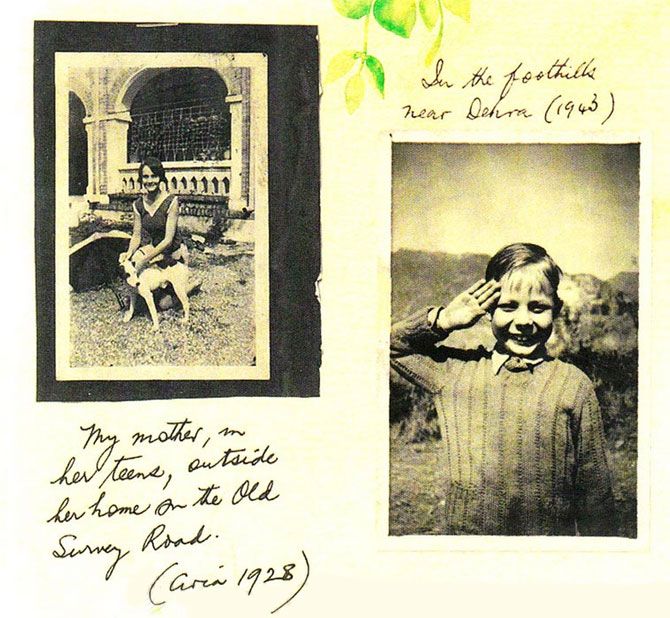
Was it because you were lonely?
That’s true. Now I find life quite funny at times.
Something to do with the altitude, where the air is thinner, you tend to get light headed… (laughs)… and find life a little more ridiculous.
How much did your first story Untouchable that was published in The Illustrated Weekly fetch you?
Rs 50. That was the standard rate that The Weekly gave which was the best in India because I also wrote stories for other magazines which usually got me Rs 25-30.
Those were the 1950s and Rs 50 was as good as a couple of thousands today.
That same year I was writing The Room on the Roof. It was a journal that I was keeping in 1951, the year I finished school so when I was sent off to England, I turned it into a novel. It took me couple of years to get a publisher.
What was the life of a writer in India in those days?
In the 50s, 60s, 70s, 80s – there were no literary festivals. Book fairs started in the 70s. There were no book launches and no television either. Writers have become like mini celebrities today.
You lived in a certain amount of anonymity which is good in a way for a writer. I think you shouldn’t get too much public attention.
You wrote your book, searched for a publisher and if you were lucky to get a good one, the book might go to book shops and somebody would come along and maybe buy one and read one.. (laughs).
That was about it and you did a lot of things by correspondence.
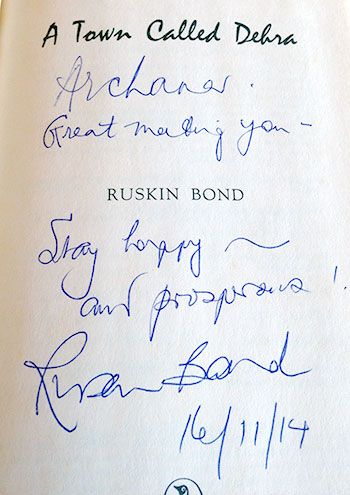
Those were different times, weren’t they? But you still write in long hand, don’t you?
I do very much so. In fact I’ve gone backwards, I used to type but now I get a stiff neck or shoulders.
I am far more comfortable writing by hand. My handwriting is good so people don’t object.
The publishers put my writing through their computers and send me a printout – that will be full of mistakes which I have to then correct... (laughs).
There are so many writers now that it is hard to keep up with the names, isn’t it?
Yes there are new writers being published every week. Even when I go to a bookstore, 2-3 writers come and give me their books, some self published.
It’s amazing the number of people who are publishing their own work.
Writers get a lot more attention now. There are writers who are enormously successful like Chetan Bhagat, Amish Tripathi and so many others.
There are certainly far more people writing today – sometimes I think there are more writers than readers... (laughs).
Long before Chetan Bhagat and Amish Tripathi, your stories had already found their readers and year after year more people get introduced to your work.
That’s true, my readership has grown and I’ve been fortunate. A lot of my stories go into school readers, kids come to know and may grow up to continue reading my stories or pass them on to their children.
I’ve really been through three generations of readers.
How have you been able to hold on to your voice when there are so many newer voices coming in everyday?
I am a very personal writer. I write direct to the reader. I don’t hold back. The reader often feels s/he knows me and is participating in my life. It gives a sort of directness and intimacy which perhaps you don’t always get.
I enjoy writing so maybe I convey that enjoyment.
Who are your favourite writers?
I am a bit old fashioned. I have my old favourites. Writers from the 40s-50s I grew up with.
I still do sometimes read PG Wodehouse, Somerset Maugham. I like reading biographies of interesting people, literary biographies, journals, diaries...
Over the years are there things that people have said to you that you remember well?
My aunt had a friend in Jersey in the Channel Islands. My aunt told her that Ruskin keeps writing these stories, they keep coming back with rejection slips and he doesn’t get discouraged. So her friend said, ‘He has a determined chin.’
I don’t see how a chin can be determined… (laughs)? Or how people can have a ‘noble nose’ or ‘intelligent ears!’
But I was determined to be a writer of course
What’s a day in your life like?
Very lazy… (laughs). I love to sleep. I try to write something everyday. Two-three pages and I usually succeed, unless there are too many interruptions.
I usually do that in the morning or if there is any correspondence that I need to deal with.
In the afternoon I usually take a nap. I have a pre-lunch nap or a post-lunch siesta, one or the other. Then do some reading early in the evening.
These days I am reading a book of detective stories that my publisher sent me. It’s good. Also an old one by Margarey Allingham.
I like detective stories. And I like classics – Conrad that I read recently.
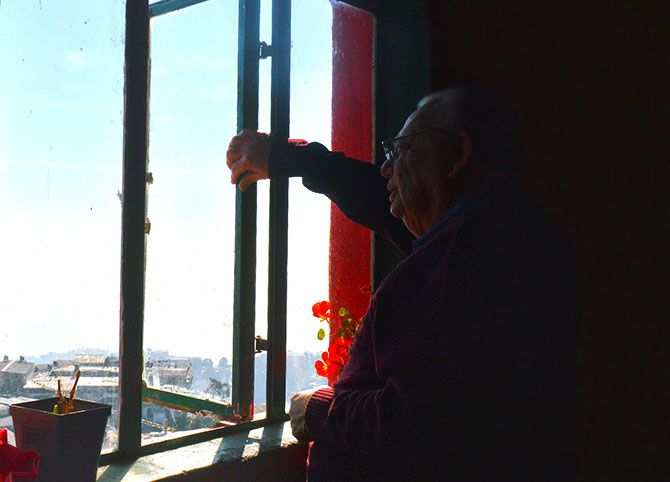
In A town called Dehra you wrote that your dream was to have your own tree, your own room, your own place in the sun – with 8 decades behind you, if not all, have most of your dreams been fulfilled?
Even in my boyhood, I had a room of my own even if it was a small one.
Even today, I have a small room – these two rooms (pointing towards them) that I live in and the rest of my adopted family have the rest of the flat.
I never want a lot of space but it should be my own (Laughs). And the room must have a window, that’s essential. I can’t live in a room without a window.
I have a nice window. I look out. I can see two or three roads below and can see what people are doing. That helps me write stories.
You look over the valley, you can see the mountains, the plains, people. I can spend time at the window without getting bored. The room is important but the window too.
In London, I had a room with a small window that overlooked a cemetery which was not very cheerful… (laughs) but that was better than nothing.
Apart from writing and napping, what are the things you enjoy?
Reading.
I used to do hiking and trekking, not any more. I am not walking as much as I used to.
I am getting more deskbound. I seem to have more work and have become busier in my old age. Since I am functioning, why not be busy?
Part II of Ruskin Bond's interview: 'If I can't write, I might as well be dead'










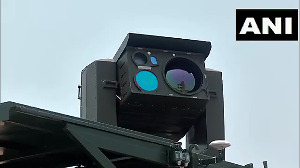
 © 2025
© 2025